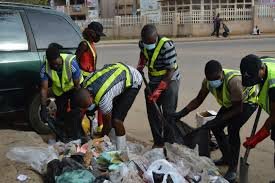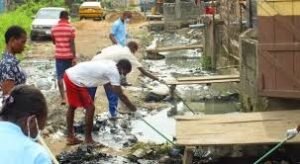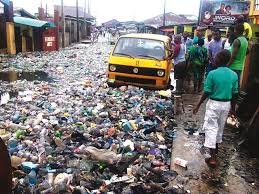From the bustling streets of Abuja, the nation’s capital city to the 36 states that make up the country-Nigeria, the struggle for basic sanitation and safe drinking water reveals a deepening crisis of environmental and public health management, often bungled by agencies of governments. Sadly, the majority of the populace has been neglected, forcing communities to grapple with unsanitary conditions and attendant health risks that threaten their very existence. Gom Mirian reports.
Failed Clean-Up/Sanitation Programme and Nation Raveling in Filths
Before 2020, Nigeria’s monthly environmental sanitation program was a beacon of hope. Every last Saturday of the month, communities united from 7 AM to 10 AM to clean their surroundings. This initiative was more than a mere aesthetic endeavour, it was a lifeline; that embodied collective responsibility. However, recent years have seen a tragic decline in this initiative, leaving neighbourhoods rife with filth and neglect.

African Health Report, (AHR) monitored the sanitary conditions in various urban clusters of Abuja and concluded that the situation requires urgent attention.
A visit to Tundunwada, a slum in the Lugbe suburb of the Abuja Municipal Area Council (AMAC), the scene is one of despair. Amid the vibrant market, filled with the chatter of local hawking wares, the backdrop speaks volumes; piles of refuse litter the streets, emanating a foul odor that greets visitors and residents into the community. “The last time we had a clean-up was ages ago,” laments AKPEH, a local trader. “People just don’t care anymore.”
Another resident, OLAYEMI, reflects on the growing problem. “This heap of waste hasn’t been cleared for two to three years. It’s embarrassing and dangerous,” he says, highlighting the recent outbreaks of cholera and monkeypox linked to poor sanitation. “The waste management attitude here is abysmal; everyone is just trying to hustle.”

Even in Abuja’s more affluent Gwarinpa Estate, beauty is overshadowed by neglect. Waste bins are a rare sight, with trash littering the streets and clogging drainage systems. MUSA ALIU, a concerned resident, points to a heap of refuse outside a nearby home. “This waste has been here for months. Many homeowners don’t bother to get waste bins, and the vans refuse to pick up the trash unless it’s in a bin,” he explains. “Only scavengers come to explore it. That’s why it is like this.”
In Sharataku, another community in AMAC, residents face dire situations. Not only do residents grapple with an unkempt environment, but they also find themselves in a struggle for something as essential as potable drinking water. Ramatu, a resident, states, “We have to drink from the river or well, and we all know how dangerous that is!” This sentiment echoes throughout the capital, where the government’s commitment to sanitation appears to have vanished.

A Nation in Sanitation Crisis
This apathy is not confined to Tundunwada or Abuja; it’s widespread.
The scale of the sanitation crisis is staggering. A 2021 report by the World Bank Group (WB) revealed that over 80 million Nigerians—more than one in five—lack access to improved sanitation facilities and 60 million without access to basic drinking water. In Kano State, 42.1% of households rely on unimproved sources of drinking water, while Lagos fares little better, with only 8.9% of households having access to safe drinking water.
The 2022 Water, Sanitation, and Hygiene National Outcome Routine Mapping (WASHNORM) found that only 67% of Nigerians have access to basic water supply services, with a mere 13% being safely managed. Alarmingly, 23% of the population still practices open defecation.
This indicates that Nigeria has significant challenges ahead if it hopes to achieve Goal eight of the United Nations Sustainable Development Goals (SDGs), which is to “ensure availability and sustainable management of water and sanitation for all” by 2030

Drowning in a Sea of Incompetence
The consequences of poor sanitation are profound. According to the Nigerian Institute of Water Engineers (NIWE), 179 million Nigerians lack access to safe drinking water.
In an interview with AHR, Dr. AMINU, a public health expert, stresses the dire health implications. “If sanitation is lacking, the cycles of disease simply repeat. The risks multiply when water sources are contaminated,” he warns.
Environmentalist STANLEY IJEOMA adds, “We treat the economy and environment as separate, prioritising economic growth while neglecting environmental issues is a fundamental mistake. Because survival is tied to environmental sustainability. We need to invest in our infrastructure to prevent disasters.”
Ijeoma argued that environmental issues must take precedence in government agendas, especially as they directly impact public health. “The increasing prevalence of waste and the impending rainy season raises the risks of cholera and other waterborne diseases, highlighting the urgent need for investment in environmental restoration.”
He noted that environmental matters fall under the concurrent legislative framework, allowing state governments to address localised challenges. “While national environmental days exist, the responsibility often falls on state governors to promote awareness initiatives like monthly environmental sanitation days to help foster public consciousness about our surroundings, but it’s up to local leaders to drive these efforts. We must take personal responsibility for our environmental health as it’s directly impacting our well-being”
stresses the necessity for local governments to tackle these issues, citing the varied environmental challenges across Nigeria’s regions. “State governments must take the lead; they are closest to the problems,” he argues. “While national awareness days exist, action needs to be local.”
The Economic Ripple Effects
The economic implications of Nigeria’s sanitation crisis are equally alarming. The World Health Organisation estimates that poor sanitation costs the country between $1.5 billion and $2 billion annually due to healthcare costs and lost productivity. “When people get sick, they can’t work, and sales plummet,” Akpeh notes, underscoring the economic toll on local markets.
Additionally, Nigeria loses approximately N455 billion (around $3 billion) each year to poor sanitation. This staggering figure includes healthcare costs and lost productivity, stifling economic growth and exacerbating poverty, according to the WASHNORM report.
A Call to Action
As Nigeria strives to meet the United Nations Sustainable Development Goals (SDGs), particularly Goal 8—ensuring availability and sustainable management of water and sanitation for all—experts question the feasibility of achieving these targets by 2030. “What do we need to turn the tide?” Dr. Aminu asks. “It requires a collective effort from local governments and communities. We can’t just sweep these realities under the rug.”
Pathways to Solutions
Addressing Nigeria’s sanitation crisis demands urgent action. Community engagement through education on hygiene and proper waste disposal can foster responsibility. Public health campaigns focused on behaviour change may empower residents to take the initiative, even in the absence of government mandates.
Investments in irrigation and filtration systems are crucial to alleviating water shortages. “Functional systems and regulations are necessary for sustainable access to clean water and sanitation,” Dr. Aminu urges. “Policies must translate into real, impactful changes for the people.”
For residents of Abuja, the desire for a cleaner, healthier environment is not a luxury—it’s a necessity. As the specter of water scarcity and poor sanitation looms, Nigeria stands at a crossroads. With a renewed commitment to enforcing environmental laws and uplifting communities, a path toward sustainable solutions may still be achievable.
The challenges of inadequate sanitation and unsafe drinking water in Nigeria present significant barriers to public health and economic stability. To pivot towards sustainable goals, relentless efforts are essential. The story of Abuja’s communities serves as a stark reminder: inaction carries far-reaching consequences. Nigeria must find its way back to cleaner, healthier, and more sustainable solutions—before it is too late.



